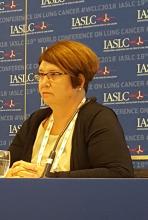TORONTO – according to findings from a retrospective study of 46 patients who were followed for 3 years after CGP.
A total of 263 genomic alterations were identified in the patients, leading to a change of therapy in 26% of cases and referral to a clinical trial in 13%, Kimberly Rohan, APN, reported at the World Conference on Lung Cancer.
The 13% referral rate was surprising, “because that’s way above the national average for enrollment in a clinical trial,” Ms. Rohan, of the Edward Cancer Center in Naperville, Ill., said during a press briefing at the meeting, sponsored by the International Association for the Study of Lung Cancer.
“Among those diagnosed with lung cancer, 6% were referred to clinical trials and 34% had a change of therapy,” she said, noting that all but one of the patients had non–small cell lung cancer, and the other had small cell lung cancer and many alterations.
Of note, three patients enrolled in hospice care based on the findings; sometimes, palliative care is the most appropriate option, and this information helps patients and their families make those decisions, Ms. Rohan said.
Patients were tested between 2014 and 2017, and the review looked at the number of genomic alterations identified in each, what treatments were associated with potential clinical trial benefits, what therapies were associated with lack of response, and the effects of the CGP findings on decision making.
An important next step is to work with payors to get them to pay for CGP testing, she said. “These tests are expensive so a lot of [insurance companies] don’t want to pay for them, but this data will help support the fact that [these tests] do allow better treatments for patients and allow patients to make better decisions for themselves in regard to treatment.”
Ms. Rohan is a speaker or advisory board member for Merck, Genentech, and AstraZeneca.


